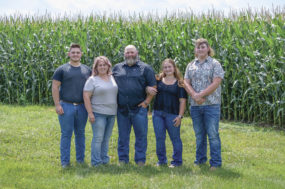In 2016, the Centers for Disease Control and Prevention (CDC) published data on suicide rates by occupation from 2012 to 2015. It was one of only a few articles that attempted to summarize suicide rates by occupation. These data showed that farmers, ranchers and other agricultural managers had a suicide rate higher than the general population.
This report ignited a conversation about mental health in rural America, and the agriculture industry responded well on a large scale. For example, the Farm and Ranch Stress Assistance Network (FRSAN) was revived in the 2018 Farm Bill and funded with $25 million in support of regional and state programs and helplines. As a result, more resources and trainings specifically related to agriculture are now available. These resources have also been specifically tailored to four geographical regions across the U.S. For example, in the Midwest, the North Central FRSAC can connect individuals with helplines, support groups and behavioral health services through the center’s website.
Although these are great resources, rural families, farms and communities still have the opportunity for progress on a much smaller, more personal scale.
Create a supportive culture on your farm
Discussions about mental health challenges likely don’t happen as often as they should in the farming sector and can be uncomfortable when they do occur. Creating a culture on your farm that is open to discussions of mental health challenges doesn’t happen quickly. It takes time to cultivate and starts with the farm’s leadership. If the manager or owner shows an openness to discuss these topics and a willingness to be vulnerable in sharing personal experiences, employees are more likely to share their stories in exchange. Showing that you genuinely care about your employees is the first step to building trust with them. One way to do this is regular private check-ins with employees.
Another way to help create this kind of farm culture is through simple things like sharing a meal together regularly or having coffee together during a team meeting. These acts can subtly build trust and friendship among employees.
On family-operated farms, oftentimes work and personal lives are intricately intertwined. A lot of pressure and emotions are involved in owning and operating a farm, so it is even more crucial in these situations that relatives are intentionally communicating their goals and struggles with each other. The next generation on a farm should always be given the opportunity to share new ideas and taught to share their emotions.
Recognize a mental health challenge
Everyone has mental health just like we all have physical health. The state of one’s mental health is a sliding scale, and each individual constantly moves along that scale in one direction or the other. When people feel repeated everyday stress, they may move along the scale toward worsening mental health. They may feel mild symptoms like headaches or tight muscles. If the amount of stress continues to increase, symptoms will continue to worsen until stressors are removed. If major symptoms persist even when no stressors are present, then the scale begins to lean toward a mental health challenge.
As with physical health, prevention or early intervention of a mental health challenge is more ideal than treatment of an acute challenge. Thus, it’s crucial to be aware of signs and symptoms of extreme stress, both in ourselves and those around us, and to be intentional with finding healthy and productive ways to relieve that stress.
One strategy to assess your own state is to check in with yourself throughout the day. Pause and reflect on how you feel. Is your chest tight? Are you unable to focus on one task? Maybe your thoughts are racing as you contemplate the worst-possible scenario for each task you face. Becoming more self-aware of your own behaviors is a great starting point.
Be on the lookout for any behavior that seems out of the ordinary. Early signs and symptoms could include constant tardiness, exhaustion, poor appearance, not enjoying work or hobbies, and the inability to concentrate. More severe symptoms include reckless behavior, substance abuse, dramatic changes in mood and threatening self-harm or suicide.
The more severe one’s stress, the more intentionality and effort it will take to heal. Finding healthy and productive outlets to relieve stress is very important to maintaining good mental health. Some popular outlets include regular gatherings of friends or family, exercising, participating in hobbies and traveling.
Have a comfortable discussion about mental health challenges
When addressing these behavioral changes in someone else, ensure you do so with a one-on-one conversation and in a private area. Broach the topic genuinely and non-judgmentally; share that you’ve noticed a few changes and ask if the individual is struggling with anything. Then listen intently to what is said. These conversations are very difficult and oftentimes uncomfortable to have. Breaking up the initial awkwardness with sincerity and compassion will help start the conversation.
Refrain from sharing a similar experience or trying to provide a solution right away because, unintentionally, this minimizes their struggle by turning the focus to you. Rather, keep the focus on them and their specific situation.
Dive deeper into the topic by gathering more information. How long has the situation been going on? Have they talked to anyone about it? Understanding the situation better will help you decide how to proceed.
If it is a non-emergency mental health challenge, showing your support is a great way to begin. If the situation merits, you can also connect them to helpful resources and suggest a counselor who is professionally trained in helping people work through these challenges. Several rural helplines are available throughout the U.S. For example, the Wisconsin Farm Center’s Farmer Wellness Program offers trainings, farmer support groups and counseling services to support farmers during times of high stress. The Center also operates the Farmer Wellness Hotline [(888) 901-2558], which is free and always open – every day and at any time – for Wisconsin farmers struggling with anxiety, depression or suicidal thoughts.
These conversations between you and your employees should always stay confidential unless you perceive it as an immediate suicide crisis. Any serious comments about self-harm or thoughts of suicide should be reported immediately. For a suicide emergency, dial 988, which has recently been dedicated to route callers to the National Suicide Prevention Lifeline. You can also dial 911.
When it comes to mental health on-farm, taking proactive steps to create a farm and family culture where honest conversations can happen will ensure everyone’s safety and wellbeing. If you truly care about your employees and want them to enjoy working on your farm, intentionally build a trusting relationship with them today so that any challenge that occurs is easier to work through together.







